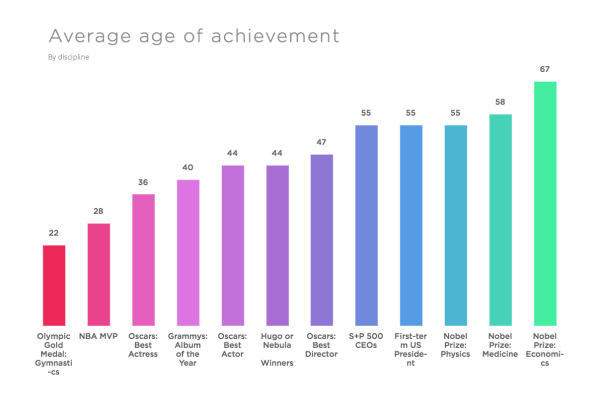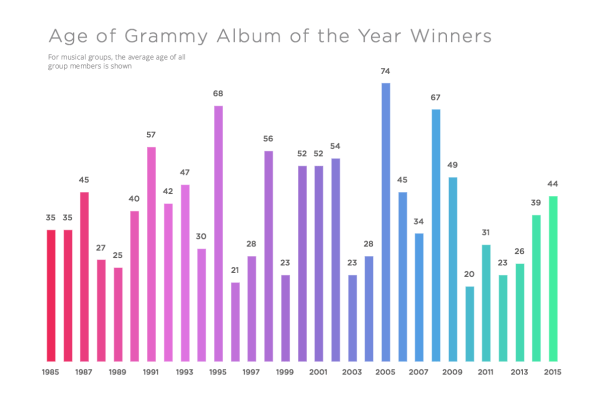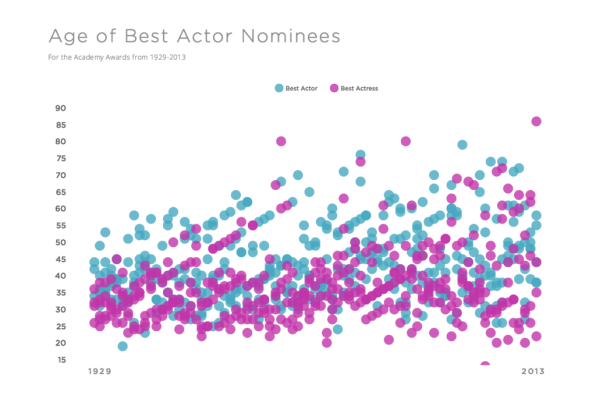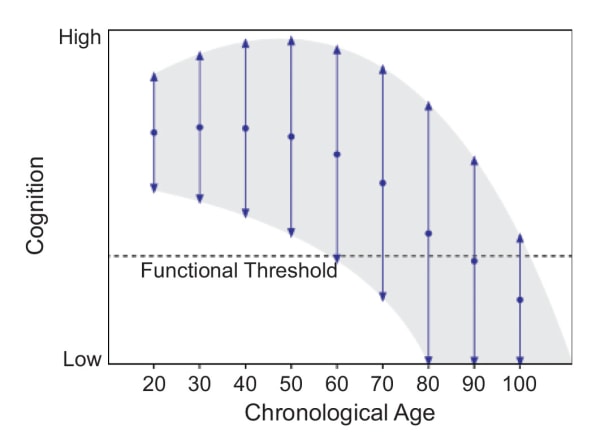What Age Can You Work at Mcdonald's in Texas
On a trip to Spain when he was about 31, Julius Caesar came across a statue of Alexander the Great—and started to cry.
This was shortly after the death of Caesar's wife, many years before he would transform the Roman Empire. A low-level public auditor at the time, Caesar purportedly told his companions, "Do you think I have not just cause to weep, when I consider that Alexander at my age had conquered so many nations, and I have all this time done nothing that is memorable?"
I'm 31 myself, and sympathize with Caesar every time I hear a goddamn Justin Bieber song on the radio. It hasn't been long since I realized that many of the writers and musicians and scientists I admire (not to mention Olympic snowboarders) are younger than me. And while I feel more in my element than ever, from time to time I can't help but hear the voice of the drummer in my college band announce in my head that the good times are over.
Youth, Achievement, And How We Perceive Them
Perhaps the human zeal for drama explains why magazines print "30 Under 30" issues celebrating youthful overachievers. We admire the fast movers, game changers, and unexpected successes of all stripes. It's clear to any sports fan that gymnasts and football players peak early. But we've got lots of examples of brainy achievers peaking young, too: Albert Einstein and Stephen Hawking developed their most groundbreaking work in physics in their 20s. Alexander Graham Bell invented the telephone at 29. Wolfgang Amadeus Mozart was composing symphonies in his teens. Jesus kicked off a global movement by 33.
In a world where actresses over 40 get suddenly swapped for 20-year-old models and Silicon Valley programmers get Botox to avoid being pegged as less innovative, we are perpetually obsessed with perpetual youth–and worse still, in often deeply sexist ways. But are we altogether wrong to peg youth to success? Does our appetite for such stories paint an accurate picture of the relationship between youth and achievement, or just feed into a wrongheaded fantasy?
If you're looking for anecdotes of "past-prime" successes, you'll find them in almost every category. Peyton Manning just won the Super Bowl at age 40, and Olympians have won medals well into their 50s (and 60s, if you count archery and curling). Quantum physicist Freeman Dyson discovered a groundbreaking solution to the oldest problem in game theory, The Prisoner's Dilemma, at age 88.
So which one is the outlier: Einstein or Manning? F-Dyson or T-Swift? Are 20-year-old actors actually preferable to more seasoned ones? Is a 40-year-old programmer actually going to be less clever on average than a recent grad? Are the good times for a middle-aged working person indeed over, or are they yet to come?
When Do We Do Our Best Work?
I took a look at the data on some of today's most successful people to find the answers:

Data show that (big surprise) athletes indeed tend to peak young, while thinkers like economists and doctors do their best work later in life. In between, we see entertainers and leaders excel in their middle age.
These are all awards and "best-of-the-best"-type achievements, so they're not exactly indicative of what a regular person's personal best will be. And they also rely to various degrees on public accolades, so the untold numbers of brilliant people who toil in obscurity, and get recognized late or not at all, aren't captured here. Still, it's interesting to note that from science to art to business to politics, people do tend to reach their apogees during, well, a pretty "average" age for their given fields.
Some, like professional athletes and CEOS, tend to cluster especially tightly around certain age ranges (because of constraints like physical prowess and work experience, respectively). However, in each of these fields, people tend to do great work at all sorts of ages. Though Adele pulled the Grammy Album of the Year down from an average of around 40 by winning at age 23, Ray Charles yanked it up by winning his Grammy at 74.

To get an ever-better picture of the age striation of people at the top of their games, here's a look at the ages of the nominees for Best Actor and Best Actress in the Oscars over the last 85 years.

After this year especially, the Academy's biases are pretty well-known (I've written more about that here), but we nevertheless see a similarly broad spread. It's true that more women in their 20s have been nominated for Best Actress than women in their 50s, but that data show plenty of actors regardless of gender scoring top honors at every stage of their careers.
In his book Old Masters and Young Geniuses, author David Galenson mapped the ages in which "genius" artists in history did their best work and found two patterns: The first he called "experimental innovators," those whose work was exploratory and filled with trial and error and decades of accumulated wisdom and feeling. Those who fit the "experimental" pattern included Virginia Woolf, Jackson Pollock, and Alfred Hitchcock, and they did their best work later in life.

Galenson called the other type of artist a "conceptual innovator," or people who break through with radical new ideas. These types of innovation often come from naïveté or recklessness—people who don't know what they don't know and therefore inadvertently employ more lateral thinking in their work—and tend to peak at young ages, like Orson Welles, Sylvia Plath, and Pablo Picasso.
Notably, renowned artists in both categories produced great work—and high volumes of creative work (good and bad)— throughout their whole lives, as Adam Grant points out in his wonderful new book Originals. The one thing they all truly had in common was that they didn't quit creating, whether they were young or old, happy or depressed.
Age Doesn't Matter (The Way You Might Think)
Personally anyhow, it's been comforting to see that many of the writers who've given a younger me a healthy sense of professional jealousy have addressed this question as well. Malcolm Gladwell has written about late bloomers, and Sam Tanenhaus has explored young writers' advantage in the New York Times. And they're both right. The data are clear that we all have the potential to do our best or most creative work at any age. It may be easier to execute a touchdown at 21 and a big-budget film at 51, but that doesn't mean we can't or shouldn't try.
In a 2008 article in the Journal of Psychological Science in the Public Interest, researchers charted the range of cognition—or how well our brains can function—at various ages. What we find is that the potential for high-functioning brain activity peaks in our 50s but remains high until our 90s and functional into the 100s; however, the average person peaks at 30 and declines to a nonfunctioning state by his or her late 80s.

In other words, while many people do their best work at average ages given what it is that they do, we have the capacity to excel at any age.
Truth is, we go through stages in our lives, and there are opportunities to do our best at various periods. What's more, the differences in the way we view accomplishments at different ages can be extremely valuable to society collectively–especially when people work together. The innovation potential at the intersection between "young genius" and "old master," for instance, is huge, especially when both parties are open to listening to and learning from one another.
No one wins Best Actress or Actor without the work of a director and a supporting cast. Pulitzer and Hugo winners would go prizeless but for their editors; Grammy winners have producers and songwriters; and Nobel Prizes are often won, to borrow a line from Isaac Newton, by "standing on the shoulders of giants."
In other words, the best world is one where we collaborate across ages and disciplines rather than treating life like an Olympic solo event.
That's the realization I had when I re-analyzed the data on U.S. presidents. Neither age nor speed of political climb was correlated with the success as a president. Instead, the best presidents were the most adaptable and open-minded. They were the ones who collaborated best with their cabinets, engaged with their allies and rivals, and used debate and disagreements as fuel for finding the right way to do things, rather than justification for the way they initially wanted to do them. (In fact, this became the basis for the first chapter in my book and this Fast Company story about leadership traits.) But age, it turns out, had nothing to do with it.
Julius Caesar's story with the Alexander the Great statue was all about motivation. He saw someone who had become his best self and decided that he could, too. And Caesar went on to conquer his corner of the world. It didn't matter that he did it in his 50s and not his 20s. What matters is that he did it.
What Age Can You Work at Mcdonald's in Texas
Source: https://www.fastcompany.com/3058870/these-are-the-ages-when-we-do-our-best-work